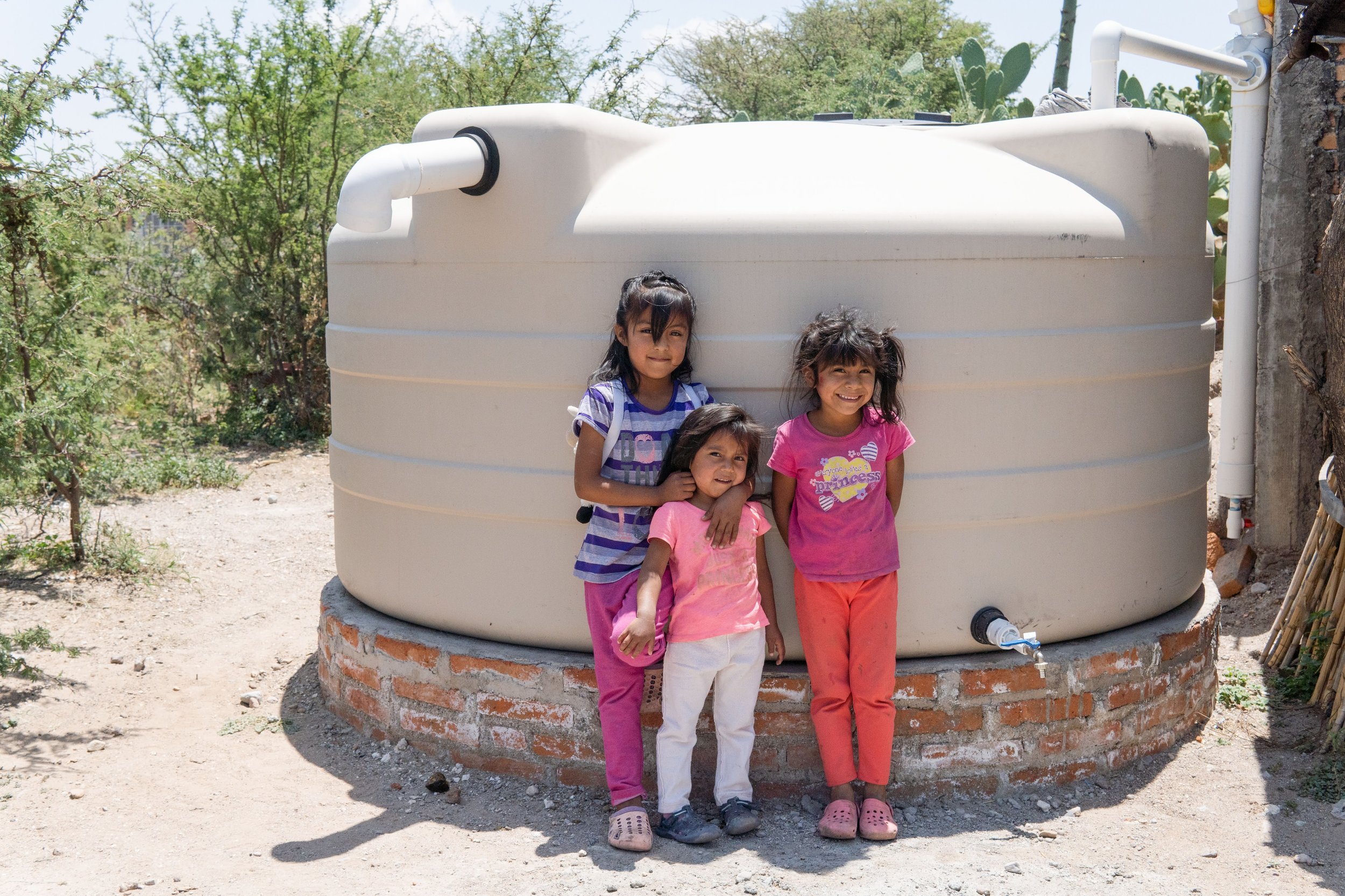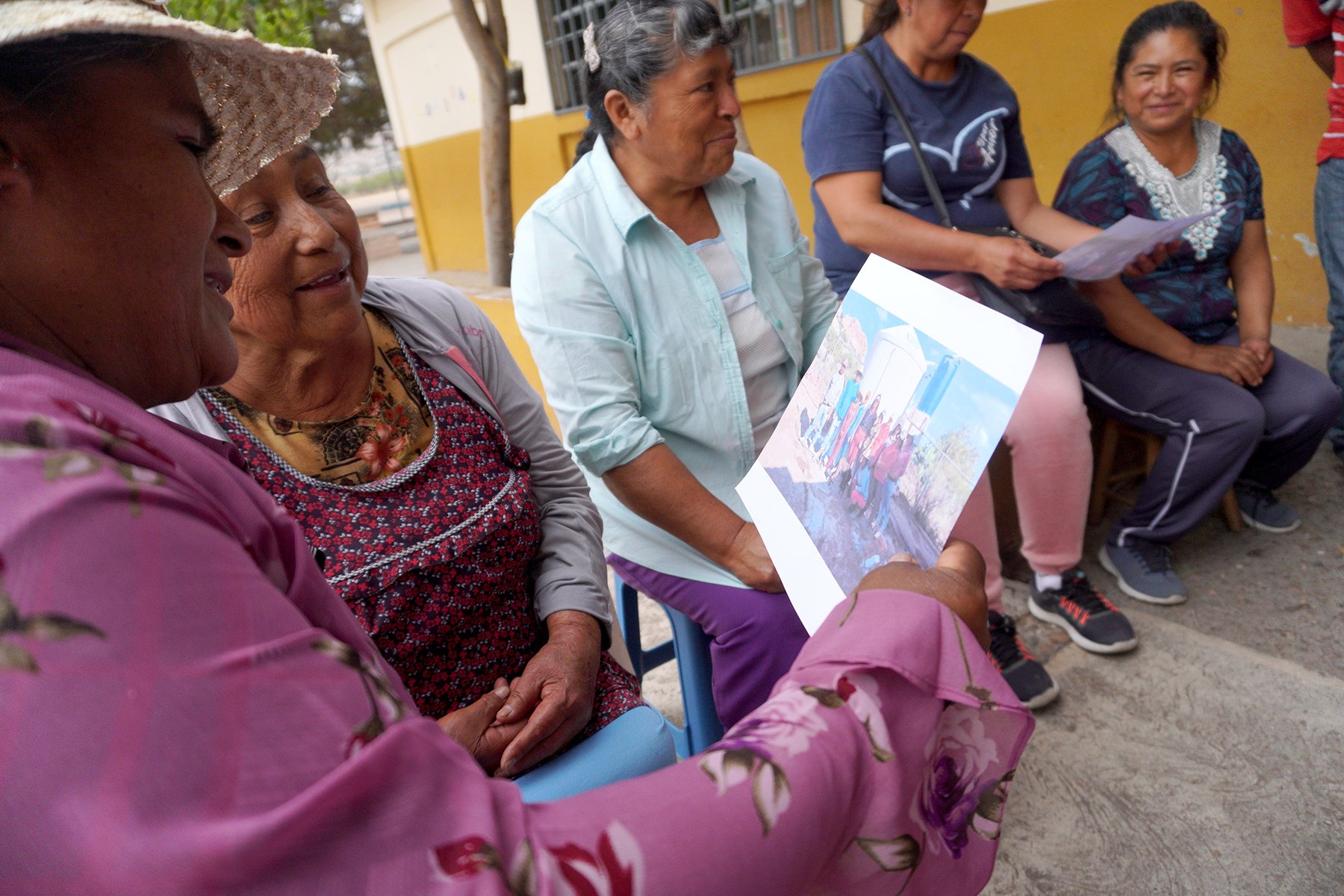
Rainwater Harvesting
Rainwater Harvesting
A Community-Driven Solution to a Water Crisis
Each year, the rainy season marks a crucial period for Caminos de Agua as rainwater cisterns across our region begin to fill. These cisterns, installed through our Rainwater Harvesting Program, provide clean water access for thousands of families. This seasonal renewal is a testament to the collaborative efforts of individuals, organizations, government entities, and grassroots communities working together to secure a vital resource of safe drinking water.
The challenge we face in our region is severe. Northern Guanajuato is identified by the World Resources Institute as one of the world’s most water-scarce areas. Unsustainable overextraction has caused the water table to drop by 0.5-2 meters annually. As wells are drilled deeper, the water becomes increasingly contaminated with harmful chemicals like arsenic and fluoride, resulting in severe health issues such as dental and skeletal fluorosis, kidney disease, developmental impairments in children, and even several types of cancer.
At Caminos de Agua, rainwater harvesting offers a critical solution. Unlike groundwater, rainwater is naturally free from chemical contaminants like arsenic and fluoride. Over the past seven years, we have installed more than 1,300 large-scale rainwater systems across the watershed, providing over 500 million liters of clean water access over their lifetime. These systems have not only improved health outcomes but have also fostered a growing network of communities dedicated to sustainable water management.
Rainwater Harvesting by the Numbers
1392 systems
Built as of 2024
524 million
Liters of clean water access created over the system’s life
160,500 hours
Volunteer hours from community partners to build the systems

The situation is particularly dire in the rural communities of San Luis de la Paz, a municipality located about an hour’s drive from San Miguel de Allende. Many communities in this region only receive water once or twice a week, and the water they do receive is often severely contaminated. Caminos de Agua’s testing has registered fluoride levels over 18 times and arsenic levels over 23 times above acceptable limits, posing significant health risks. Despite these challenges, a beacon of hope has emerged over the past decade through the work of CUVAPAS (United Communities for Water and Life). This grassroots organization has been on the frontlines, helping bring solutions to the communities most affected by the water crisis.
Led by Luz Villafuerte, CUVAPAS has spent over 13 years empowering communities to take control of their water future. Luz’s unwavering commitment to promoting community-led processes has left an indelible mark on northern Guanajuato and beyond. CUVAPAS provides accurate information, educational workshops, and technical training while ensuring that communities actively participate in shaping their own destinies. As Luz explains:
Luz Villafuerte from CUVAPAS
"A grassroots organization [like CUVAPAS] has the responsibility to ensure that communities themselves take ownership of the process, actively participating in a continuous learning and leadership experience."
Our partnership with CUVAPAS began in 2011 with a water quality monitoring program. Together, we tested dozens of community wells, revealing alarming levels of contamination. The data collected was eventually presented to the Permanent Peoples’ Tribunal, an international human rights body, which in 2013 declared that the Upper Río Laja Watershed should be classified as an emergency zone due to environmental and health risks.
In response to this crisis, CUVAPAS and Caminos de Agua collaborated on implementing sustainable solutions, such as rainwater harvesting systems. Over the years, CUVAPAS has facilitated countless workshops and built hundreds of these systems, helping thousands of people transition away from contaminated water sources.
Rainwater harvesting is a transformative tool for communities like San Diego de la Unión and others in Northern Guanajuato. As Carmen Castro Mata, a key partner in our Rainwater Harvesting Program and a representative of Pozo Ademado Community Services (SECOPA), notes:
Carmen Castro from SECOPA
“The majority of the people benefiting from rainwater harvesting come to see water through different eyes. They’ve learned that water coming from wells can run out or is contaminated, and rainwater thus becomes really important for them.”
Carmen and SECOPA have been instrumental in leading rainwater harvesting efforts in communities like Pozo Ademado, where they address not only water access but also critical health issues linked to fluoride and arsenic contamination. As Carmen shares:
“The water we drink has [high levels of] fluoride, and we see the impacts in so many people through dental and skeletal fluorosis... For me, some of my teeth have fallen out, and it’s happening to many people in different communities. This affects our health and our self-esteem... [So] what we do is inform people and communities about this problem...and one immediate solution is rainwater harvesting.”
SECOPA has long been a referential organization in the region, promoting not only rainwater harvesting but also alternative medicine, nutrition, and environmental preservation. Through their partnership with Caminos de Agua, they have monitored water quality, participated in coalitions, helped build a human rights case, and installed hundreds of rainwater harvesting systems and water filters—positively impacting the public health of thousands in our region.
Driving through a backroad in the municipality of San Diego de la Unión in northern Guanajuato, you pass through massive agricultural production sites until you reach the community of Pozo Ademado—home to 300 families and SECOPA, one of our most important collaborators. Here, the water crisis is a daily reality. As Carmen states, “In our community, we only receive water once a week,” and the little water they do receive is contaminated with fluoride at more than double the World Health Organization’s limit.
Rainwater harvesting has become an effective way to help people in San Diego de la Unión and other communities in northern Guanajuato mitigate the impacts of arsenic and fluoride in their water. Carmen has seen firsthand how this resource has become crucial for these communities’ well-being.
The water problems in Pozo Ademado mirror those faced by hundreds of communities throughout our watershed. Currently, we are working closely with SECOPA to build dozens of rainwater harvesting systems in eight communities, while also collaborating with other groups to build many more systems across the region.
Ensuring the safety of rainwater and the success of these programs in our region, however, has necessitated that we create comprehensive networks of collaboration. It requires the involvement of supporters, like you, water quality experts and technologists, institutional and corporate partners, and most importantly our dedicated community partners and grassroots organizational partners who are deeply invested in understanding and dedicated to resolving our regional water crisis.

Expanding Impact through Collaboration
The impact of our partnerships has been remarkable. Not only do they provide more clean water access than any one organization could achieve alone, but they also strengthen community bonds and deepen the understanding of how collective action can drive meaningful change.
By integrating technical solutions with community empowerment, we continue to advance toward a sustainable future where everyone has access to safe, clean water.

Our Project Map
We work in partnership with local communities and grassroots organizations to create long-term sustainable water solutions through projects and trainings in both rural and urban communities. Our current work includes production and distribution of our certified Ceramic Filters for eliminating water-borne pathogens, community-based installations of rainwater harvesting systems, and installation of biochar treatment systems. Learn more about our community-led rainwater harvesting projects, on our Project Map.
Support Our Work
Caminos de Agua is a nonprofit organization that creates access to clean drinking water through a unique, proven participatory and grassroots approach. Our projects currently provide clean water access to more than 50,000 people in the Upper Río Laja Watershed as well as throughout Mexico. Our goal is to reach 250,000 by 2030. Support our work by making a donation today.



